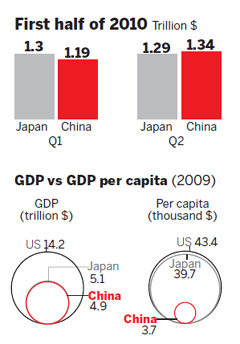China No. 2 in Q2 GDP
|
|
|
The gap in terms of per capita income between China and developed nations, including the US and Japan, remains considerable, as China's per capita GDP of less than $4,000 a year is just a tenth of the latter two, economists said. [Baidu] |
China's economy in the second quarter overwhelmingly outperformed that of Japan, fueling a long-time expectation that China will unseat Japan as the world's second-largest economy by the end of this year, behind only the United States.
Japan's second-quarter GDP totaled nearly $1.29 trillion, the Japanese Cabinet Office announced Monday, lower than China's $1.34 trillion in the same period, which was announced in July.
GDP expansion slowed to just 0.4 percent in the three months ended in June, well below a median market forecast of 2.3 percent, after a revised 4.4 percent growth in the first three months of the year, the Cabinet Office said. By comparison, official data showed that China's economy achieved a growth rate of 10.3 percent in the second quarter.
Bloomberg quoted Shen Jianguang, a Hong Kong-based economist at Mizuho Securities Asia Ltd, as saying that "It is not likely that Japan will retake the No. 2 spot, given the likely growth rates."
"Although China has experienced staggering economic development in the past decade, China's growth momentum won't stop, and China enjoys huge room to develop and catch up with developed nations," Wang Tao, chief economist with the United Bank of Switzerland (US, told the Global Times Monday.
But China moving into the second spot is dubbed a "symbolic" milestone, as many analysts say it is per capita calculations that matter most.
The gap in terms of per capita income between China and developed nations, including the US and Japan, remains considerable, as China's per capita GDP of less than $4,000 a year is just a tenth of the latter two, economists said.
Japan's citizens are among the world's richest, with a per capita income of $37,800 last year, compared with China's $3,600, the AP reports. US citizens boast a per capita income of $42,240.

"During the past three decades, we prioritized in total GDP growth. But from now on, we have to focus on distributing wealth," Ba Shusong, deputy director of the Institute of Finance at the State Council Develop Research Center, told the Global Times.
In the wake of the Japanese government's announcement, Chinese experts reiterated calls that China deserves a bigger say in international organizations such as the International Monetary Fund and the World Bank, given the contributions it has made and the growing role it plays.
"China's robust economic growth in 2009 offset the dramatic decline of the US economy during the global financial crisis. China played a crucial role in stabilizing the global economy during the hardship," Ba said.
Given China's rapid economic growth following the global financial crisis, some warned that China's economy may slow if its real estate sector collapses, just as Japan's did two decades ago.
Wang, with US said the risk is there, but China is able to avoid such a collapse by learning from Japan's mistakes.
Japan has retained the No. 2 spot on the GDP list since 1968, when it overtook West Germany, the AP reported, adding that its "economic miracle" turned into a huge real estate bubble in the 1980s before imploding in 1991.
However, in a Reuters report Monday, Keisuke Tsumura, a parliamentary secretary at the Cabinet Office, said that it would be misleading simply to compare quarterly growth figures.
"It would be correct and fair to compare the figures for the whole year," Tsumura said.
In the first six months of 2010, Japan's GDP before seasonal adjustments totaled $2.59 trillion, surpassing China's $2.53 trillion, Reuters reported.
 0
0 



![The gap in terms of per capita income between China and developed nations, including the US and Japan, remains considerable, as China's per capita GDP of less than $4,000 a year is just a tenth of the latter two, economists said. [Baidu] The gap in terms of per capita income between China and developed nations, including the US and Japan, remains considerable, as China's per capita GDP of less than $4,000 a year is just a tenth of the latter two, economists said. [Baidu]](http://images.china.cn/attachement/jpg/site1007/20100817/0011111fa1560dd41b3001.jpg)



